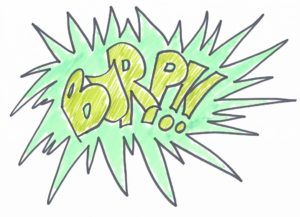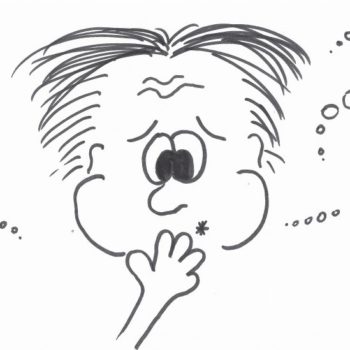Retrograde Cricopharyngeus Dysfunction (R-CPD)
Many people suffer of an inability to burp (R-CPD). They are noburpers.
Many people have a strange condition: They cannot belch/burp. Often, these people think they are alone and do not know that many others suffer from this condition. They have Retrograde Cricopharyngeal Dysfunction, or R-CPD.
„For those who can’t burp. It’s real, and it sucks.“
„I am 30 years old and I have never been able to burp. When I try to burp, I just get an artificial cough, or you almost throw up. I think the worst symptom for me was gurgling in the throat.“
„Like many others, I can never belch. I have big problems with bloating, flatulence and frills. The only relief I could find, the vomiting the air. I constantly had to choke to relieve the bloating and gurgling.“

Most patients are between the ages of 20 and 30, but any age can be affected. Many patients have had the problem since childhood, but it was never diagnosed.
„Carbonated drinks are hell. The air doesn’t make me feel sick immediately, but I have severe chest pain. I have this pain every day so I can’t do much. Sometimes I hit my chest hard and try to force the air out.“
Possible causes for inability to burp / Retrograde Cricopharyngeus Dysfunction (R-CPD)
There is no known definitive cause for this condition. The function of the cricopharyngeal muscle is to prevent reflux of stomach contents into the throat. When this muscle goes into constant spasm, simple regurgitation is prevented.
The inability to burp is a dysfunction caused by the cricopharyngeal muscle. The cricopharyngeal muscle is a band of muscle that forms the upper esophageal sphincter. This is a valve-like area in the throat. The cricopharyngeal muscle constricts the pars laryngea of the pharynx, thereby pushing food toward the esophagus during swallowing.
The sphincter muscle is the culprit.
The inability to burp is a dysfunction caused by the cricopharyngeal muscle. The cricopharyngeal muscle is a band of muscle that forms the upper esophageal sphincter. This is a valve-like area in the throat. The cricopharyngeus muscle constricts the pars laryngeal of the pharynx, pushing food toward the esophagus during swallowing.
The cricopharyngeal sphincter is normally in a state of contraction and only relaxes to allow the passage of food downward or upward during burping (and vomiting). In people who are unable to burp, the cricopharyngeal muscle is unable to relax, and gas is often trapped in the esophagus. Patients with this disorder often complain of the above symptoms and sometimes of gurgling deep behind the chest wall. They often avoid carbonated beverages, which can significantly worsen their symptoms. Many patients also complain of air in the abdomen (bloating). The abdomen is uncomfortably distended and causes pain.

Hope: Targeted injections
Dr. Robert W. Bastian of the Bastian Voice Institute, Chicago, identified the cricopharyngeus muscle as a possible source of distress. Dr. Bastian also authored the first publication on retrograde cricopharyngeal dysfunction (R-CPD), „Inability to Belch“. His therapeutic approach is a targeted injection of a neurotoxin into the pharynx. Apparently, it was the right approach, as the patients were able to regurgitate after a few days.
Prof. Markus Hess learned the correct injection technique from Dr. Bastian in Chicago and uses it successfully with his patients with R-CPD.
Treatment: Injection Therapy
R-CPD is treated by injecting Botox into the cricopharyngeus muscle. This causes temporary partial paralysis of the muscle, allowing regurgitation. The injections are usually given under short anaesthesia on an outpatient basis (i.e., without an overnight hospital stay). Most patients learn to burp within 3 to 30 days. Some patients may need a repeat injection.
Complications
Some patients may experience temporary excessive belching and difficulty swallowing, but this usually improves as the effects of the injection wear off. If the nerves of the vocal cords are affected, voice changes may occur as a side effect, as well as difficulty breathing. However, these symptoms should improve within a few weeks or months. Serious complications are rare. Overall, this is a very helpful and effective therapy that can help patients achieve a significantly improved quality of life.
R-CPD – Effects on everyday life.
No chance to burp
-
No possibility of burping consciously or unconsciously and letting air escape from the stomach upwards.
-
Bloated, painful feeling of fullness after meals. The air builds up in the stomach. Always the feeling that the air wants to ascend the esophagus, but meets a blockage.
Bloating of the abdomen
-
As the day progresses, the stomach becomes bloated (even without meals).
-
Abdominal pain when traveling by plane from 1.5 hours due to long sitting and the developing air bubble in the abdomen.
Frog-like air noises
-
The fact that the air does not come out creates uncontrollable dull, gurgling, frog or toad-like noises. This is particularly unpleasant for the environment.
Embarrassing moments because of excessive flatulence
-
Excessive, severe flatulence, on the one hand, after large meals and, on the other hand, when meals are completely absent.

